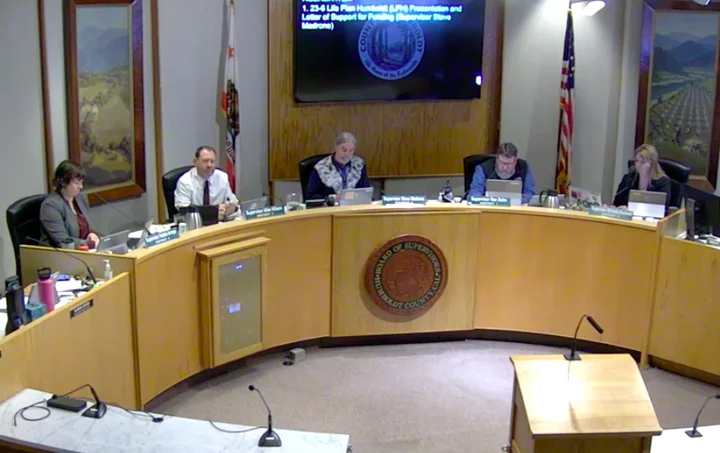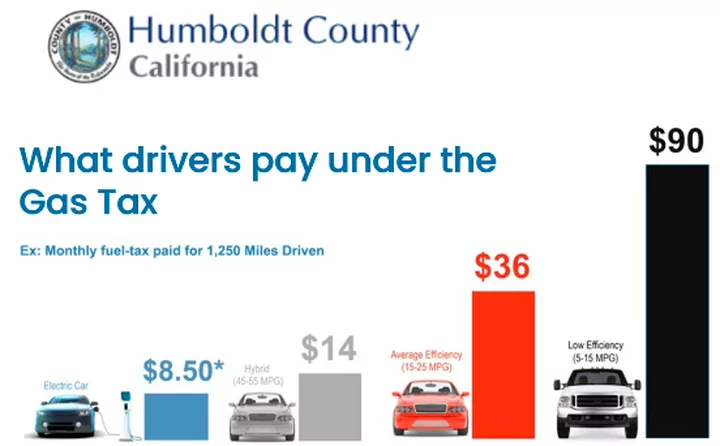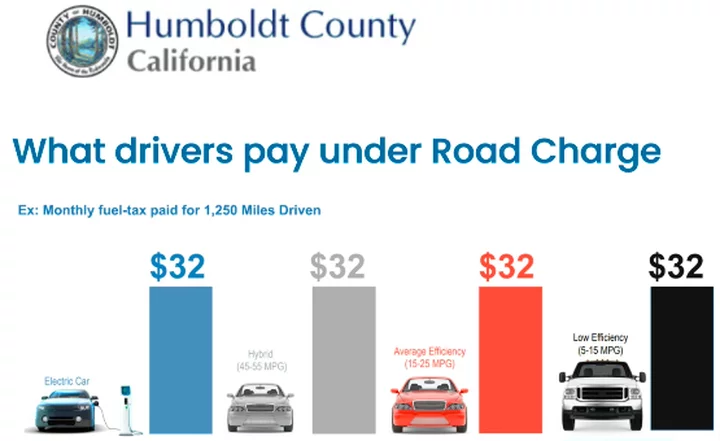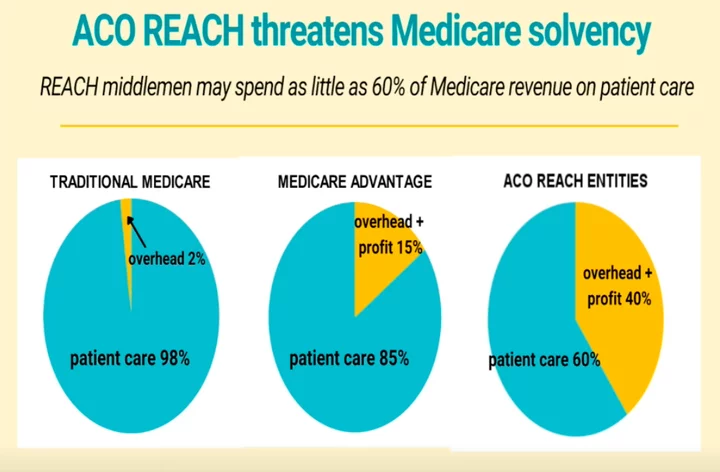Screenshot of Tuesday’s Humboldt County Board of Supervisors meeting.
###
Should California get rid of its gas tax in favor of something more equitable?
As electric vehicles become more and more prevalent, the state is looking for a new way to fund roadway maintenance and repairs that aren’t based on gas taxes. The “California Road Charge Program” would serve as an alternative funding mechanism based on miles driven rather than the amount of fuel used by an individual driver.
During a presentation to the Humboldt County Board of Supervisors on Tuesday, Lauren Prehoda, Road Charge Program Manager for Caltrans, described the road charge program as a way to “bring that fairness back into the tax system.”
“We’re seeing this greater unfairness in what people are paying in terms of their taxes,” she said. “Basically, we’re taking one collection mechanism and switching it out for another. We’re not necessarily looking at changing how the money is spent. The money is already being spent [on] our state and local roads, transit, active transportation, all those things. We’re looking at one per mile rate for all passenger vehicles … so everyone is paying the same to use the road.”
Screenshot
###
Screenshot
Caltrans and the California State Transportation Agency (CalSTA) are working with tribes and rural communities in Humboldt County on the Public/Private Roads Pilot Project. Currently, when a driver is on a private road, they are still paying for the gas tax even though there are no public funds going into the maintenance of that road. The pilot program will utilize GPS technology to differentiate between when a vehicle is driving on a public road versus a private road.
“For example … say you have a farmer who’s driving on his private frontage road that’s exactly parallel to the public highway,” Prehoda explained. “In one case, he should be paying a tax, and in the other he should not. Right now, under the gas tax system, there’s no way that you can differentiate between [the two]. … We also want to understand if there are any tax benefits specifically for rural drivers in embracing those higher-tech solutions.”
Those interested in participating in the pilot project will receive up to $250 in incentives. “Basically, you’ll need to sign up and you’ll have a little device sent to you to plug into the OBD-II Port of your vehicle and you just drive around for six months as you usually would,” Prehoda said. “Then you’ll take some surveys and that’s it.” You can sign up here.
Third District Supervisor Mike Wilson said the road charge proposal “sounds fair” but pointed out inequities between vehicle weight/size and infrastructure impacts.
“How much maintenance, wear and tear on a road [does] a larger, heavier vehicle have?” he asked. “I know that there is a tendency for larger vehicles [to be used] in more rural areas due to work and other things … but I just want to make sure that, at the very least, you guys are considering that because it is not necessarily fair and equitable [for] someone who is using less resources [to] subsidize those who are using more resources.”
Prehoda acknowledged the disparity, noting that “one person’s idea of fairness is not necessarily [that] of another,” but maintained that vehicle weight only becomes an issue at a commercial scale.
“The relationship between weight and the impacts to our transportation system is not linear, it’s actually exponential,” she said. “In the lower ends of the weight categories, there’s really not that much of a difference in terms of the impact to the roadway and bridges. And really, that’s everything around 10,000 lbs and below. … When you get above that in the commercial vehicle space … that’s where you see significant damage.”
After some additional discussion, Wilson made a motion to accept and file the report, which was seconded by Second District Supervisor Michelle Bushnell.
The motion passed 5-0.
Life Plan Humboldt Senior Living Community
The board also received a presentation from Life Plan Humboldt, an organization looking to build a resident-run senior living community in McKinleyville. The community – which would offer 144 independent cottages and apartments for residents 60 years and older – would be the first of its kind on the North Coast.
“We’ll provide assisted living level services to people in their homes and memory care all on one campus,” Ann Lindsay, president of the Life Care Humboldt board of directors, said during this week’s meeting. “We’ll have dining and fitness, a wellness center, meeting space, picnic areas and trails. … We really want to provide a lifelong opportunity for learning, growth and wellness, and to integrate into the broader community.”
Life Plan Humboldt experienced a bit of a setback last year after Cal Poly Humboldt snatched a piece of property the nonprofit had been eyeing on the outskirts of Arcata.
“We’re currently negotiating for property in Mckinleyville that will be part of the McKinleyville Town Center,” Lindsay said. “It’s a fantastic location for us. We’ve surveyed prospective members and they all want to be within walking distance of amenities, and there certainly are a lot of amenities in Mckinleyville. … We have some alternatives, but this is where we’re working currently.”
The organization is hoping to raise $2 million from local individuals, businesses and foundations to pay for pre-financing development costs, Lindsay said. They’re hoping to secure another $2.5 million in one-time state funding to secure the $75 million needed in bond financing to complete the project.
The board expressed support for the senior living community and unanimously agreed to sign a letter of support for the project.
Privatization of Medicare
The board also received a presentation surrounding the privatization of Medicare through the Direct Contracting Entities (DCE) and Accountable Care Organization - Realizing Equity, Access, and Community Health (ACO-REACH) programs, also known as the “Medicare Advantage” plan.
Two local members of Health Care for All and Physicians for a National Health Program Humboldt, Patty Harvey and Corinne Frugoni, warned us about this issue a few months back. The pair asserted that Medicare “Advantage” is not traditional Medicare.
“They are draining the Medicare trust fund and, unfortunately, that is affecting the solvency of this public trust that we have all paid into,” Frugoni explained during a lengthy presentation to the board. “‘Medicare Advantage’ has convinced individual seniors to sign up for [its] programs with a lot of slick advertising and because premiums are less under ‘Medicare Advantage’. However, what seniors don’t recognize is that it can affect their ability to get the care they need if they become really sick because it affects the solvency of the Medicare trust fund.”
Screenshot
Frugoni and Harvey asked the board to send a letter of opposition to the ACOO-REACH program to California Health & Human Services Secretary Xavier Becerra.
First District Supervisor Rex Bohn acknowledged their concerns but questioned whether “shutting down this program is how we get there.”
“I mean, it was a great presentation – it scared the hell out of me – but I also have to go by what I’ve found out, what I’ve looked at,” he said. “This model has been in place for 31 days and we’re expected to write a letter saying this is the worst thing that’s ever happened? I think we need to be a little more open-minded. … I need to know more information.”
Frugoni pushed back, noting that the program has been in the works for two to three years under its former name, DCE.
Shortly after public comment, Wilson made a motion to approve staff’s recommendation to send a letter to state representatives opposing the privatization of Medicare. Fourth District Supervisor Natalie Arroyo seconded the motion.
Bohn reiterated his reluctance to support the letter of opposition “just for lack of information.” The motion passed in a 3-1-1 vote, with Bohn dissenting and Bushnell abstaining.
###
You can find a recording of Tuesday’s meeting at this link.




CLICK TO MANAGE